Difference between revisions of "Confrontation"
(Preface entry added, link to uploaded scan and blockquote of preface added.) |
|||
| (6 intermediate revisions by 2 users not shown) | |||
| Line 10: | Line 10: | ||
:The decay of Stalinism now offers the potential to rehabilitate Marxism. After the Gorbachev reforms are implemented it will no longer be possible to blame Marx and Lenin for the failings of the Stalinist bureaucracy. Whatever the short term cost of capitalist restoration in the Stalinist world, the destruction of Stalinism will remove an historic barrier to the self-emancipation of the international working class'.<ref>[[Frank Richards]], 'Thesis on Stalinism in the Gorbachev Era', in ''The death agony of Stalinism - A symposium''', ''[[Confrontation]]'', No. 5, Summer 1989, p. 101-110.</ref> | :The decay of Stalinism now offers the potential to rehabilitate Marxism. After the Gorbachev reforms are implemented it will no longer be possible to blame Marx and Lenin for the failings of the Stalinist bureaucracy. Whatever the short term cost of capitalist restoration in the Stalinist world, the destruction of Stalinism will remove an historic barrier to the self-emancipation of the international working class'.<ref>[[Frank Richards]], 'Thesis on Stalinism in the Gorbachev Era', in ''The death agony of Stalinism - A symposium''', ''[[Confrontation]]'', No. 5, Summer 1989, p. 101-110.</ref> | ||
| − | As it turned out, the cost of capitalist restoration was not short term, but quite long lived. At this stage however, the party appeared still to believe that it had a bright future. Introducing the symposium papers [[Mike Freeman dismissed the 'British Left's traditional approach of swapping impressions and trading labels' remind readers that whatever the RCP was it was not part of the British left. Instead the papers were said to 'represent the first stages of the RCP's investigation of the demise of world Stalinism' discussion of which 'we hope to continue in the journal'.<ref>[[Mike Freeman]] 'Editorial: Stalinism.. RIP', ''[[Confrontation]]'', No. 5, Summer 1989, p. 5-11.</ref> As it turned out the journal then disappeared with no further issues for seven years, by which time the party had resolved to abolish itself. | + | As it turned out, the cost of capitalist restoration was not short term, but quite long lived. At this stage however, the party appeared still to believe that it had a bright future. Introducing the symposium papers [[Mike Freeman]] dismissed the 'British Left's traditional approach of swapping impressions and trading labels' remind readers that whatever the RCP was it was not part of the British left. Instead the papers were said to 'represent the first stages of the RCP's investigation of the demise of world Stalinism' discussion of which 'we hope to continue in the journal'.<ref>[[Mike Freeman]] 'Editorial: Stalinism.. RIP', ''[[Confrontation]]'', No. 5, Summer 1989, p. 5-11.</ref> As it turned out the journal then disappeared with no further issues for seven years, by which time the party had resolved to abolish itself. |
[[Image:Confrontation, Part 2, 1987.jpg|thumb|right|200px|Cover of ''[[Confrontation]]'', No.2, showing articles by both [[Linda Ryan]] and [[Frank Richards]]. Both names were pseudonyms for [[Revolutionary Communist Party]] leader [[Frank Furedi]].]] | [[Image:Confrontation, Part 2, 1987.jpg|thumb|right|200px|Cover of ''[[Confrontation]]'', No.2, showing articles by both [[Linda Ryan]] and [[Frank Richards]]. Both names were pseudonyms for [[Revolutionary Communist Party]] leader [[Frank Furedi]].]] | ||
| Line 62: | Line 62: | ||
**Authors include [[Jon Hann]], [[Mike Freeman]], [[Joe Hall]], [[Kenan Malik]], [[John Gibson]], [[Eve Anderson]] | **Authors include [[Jon Hann]], [[Mike Freeman]], [[Joe Hall]], [[Kenan Malik]], [[John Gibson]], [[Eve Anderson]] | ||
===Volume II=== | ===Volume II=== | ||
| + | [[Image:Confrontation Vol 2 No 1.jpg|thumb|right|200px|''Confrontation'', Volume 2 Number 1, the 'theoretical journal' of the [[Revolutionary Communist Party]], 1996, [[Junius Publications]].]] | ||
The journal appears to have been resurrected briefly in 1996 when [[Living Marxism]] advertised it as '''Confrontation: A Moral Impasse''' and described it as the RCP 'theoretical journal'.<ref>See ''[[Living Marxism]]'', No. 96, December 1996/January 1997, p.42.</ref> It was said to be edited by [[Lynn Revell]] and [[James Heartfield]]. The first, and seemingly only, number of 'volume II' included an article by Heartfield: | The journal appears to have been resurrected briefly in 1996 when [[Living Marxism]] advertised it as '''Confrontation: A Moral Impasse''' and described it as the RCP 'theoretical journal'.<ref>See ''[[Living Marxism]]'', No. 96, December 1996/January 1997, p.42.</ref> It was said to be edited by [[Lynn Revell]] and [[James Heartfield]]. The first, and seemingly only, number of 'volume II' included an article by Heartfield: | ||
| − | *[ | + | ====Contents==== |
| − | *[[ | + | |
| + | *Contributors & Preface, a scanned pdf can be viewed [http://powerbase.info/images/f/fc/Confrontation_Volume_2_Number_1_Preface.pdf here]. ''A Moral Impasse: The End of Capitalist Triumphalism'', ''Confrontation'', Vol II, No. I, London: Junius, 1996. | ||
| + | |||
| + | <blockquote style="background-color:beige;border:1pt solid Darkgoldenrod;padding:1%">''Confrontation'' is a Marxist journal that is committed to challenging the contemporary climate of irrationalism and anti-humanism. | ||
| + | |||
| + | The intellectual exhaustion that has engulfed not just the left but all political traditions presents a challenge to everyone who favours progress and reason. Regressive trends to curb democratic rights, scientific developments and freedom of speech are all symptomatic of the way that our narrowing political culture is growing increasing hostile to the development of human agency and subjectivity. | ||
| + | |||
| + | The closure of political options and debate could be a barrier to new ideas. At ''Confrontation'', however, we believe that this is the best time to reclaim the banner of critical thinking. The collapse of the old political framework presents many challenges, but also many opportunities. For the first time in 70 years revolutionaries are free of the baggage of past programmes and projects to map out a new course for society. | ||
| + | |||
| + | ''Confrontation'' will be dedicated to creating the revolutionary theory for a new revolutionary project.<ref>Text taken from the Preface to ''A Moral Impasse: The End of Capitalist Triumphalism'', ''Confrontation'', Vol II, No. I, London: Junius, 1996.</ref></blockquote> | ||
| + | |||
| + | *Contents page, a scanned pdf can be viewed [http://powerbase.info/images/a/a4/Confrontation_Volume_2_Number_1_Contents.pdf here]. ''A Moral Impasse: The End of Capitalist Triumphalism'', ''Confrontation'', Vol II, No. I, London: Junius, 1996. | ||
| + | *Introduction, a scanned pdf can be viewed [http://powerbase.info/images/1/17/Confrontation_Volume_2_Number_1_Introduction-opt.pdf here]. ''A Moral Impasse: The End of Capitalist Triumphalism'', ''Confrontation'', Vol II, No. I, London: Junius, 1996. | ||
| + | <blockquote style="background-color:beige;border:1pt solid Darkgoldenrod;padding:1%">In this issue Phil Mullan looks at the way that economic science has become increasingly preoccupied with the subjective responses of individuals; James Heartfield examines the way that academia has lost its faith in reason; Norman Lewis reviews the lost certainties of Cold War politics in international relations; Lynn Revell challenges the penchant for cultural explanation in social life; Jane Cullen looks at the real fears behind the underclass debate; and Andy Clarkson questions the underlying problem with nationalism today. | ||
| + | |||
| + | In their different ways all of these articles are looking at the moral impasse that bedevils the elites throughout the Western world. The intellectual crisis that we find in these different fields is itself a reflection of the loss of purpose that has engulfed the West. In economics it is the loss of the alternatives of Keynesianism and the free market that forces the drift into a subjective speculation over confidence. In academic life the growth of anti-rational currents like postmodernism arises out of the falling away of the 'grand narratives' of liberalism and socialism, exposing the meagre rational resources of a compromised elite. In international relations the loss of the certainty of the Cold War has led to a veritable nostalgia for the days of the Cuban missile crisis, when the ruling classes at least knew | ||
| + | where they stood. With the falling away of social explanations, culture is thrust forward as the universal, and empty, explanation of social and international division. In the underclass debate, we find an elite whose loss of moral purpose is projected, viciously and arbitrarily, upon the poor. And finally, even the elite's trump card, popular nationalism, presents a barrier to elite politics today. | ||
| + | These essays are not meant as historical monographs on a bygone age. Rather they are the first step in claiming the abandoned ground of reason for revolutionaries. The events of the past six years have presented us with profound challenges, but they also present us with profound opportunities.<ref>Text quoted taken from the Introduction to ''A Moral Impasse: The End of Capitalist Triumphalism'', ''Confrontation'', Vol II, No. I, London: Junius, 1996.</ref> </blockquote> | ||
| + | |||
| + | *[[Phil Mullan]], 'Confidence in the Slump', ''A Moral Impasse: The End of Capitalist Triumphalism'', ''Confrontation'', Vol II, No. I, London: Junius, 1996. | ||
| + | *[[James Heartfield]], 'The limits of social construction theory', ''A Moral Impasse: The End of Capitalist Triumphalism'', ''Confrontation'', Vol II, No. I, London: Junius, 1996.<ref>James Heartfield [http://www.heartfield.org/ James Heartfield's Homepage], accessed 9 April 2011</ref> | ||
| + | *[[Norman Lewis]], 'America after the Cold War', ''A Moral Impasse: The End of Capitalist Triumphalism'', ''Confrontation'', Vol II, No. I, London: Junius, 1996. | ||
| + | *[[Lynn Revell]], 'The Cultural Apology', ''A Moral Impasse: The End of Capitalist Triumphalism'', ''Confrontation'', Vol II, No. I, London: Junius, 1996. | ||
| + | *[[Jane Cullen]], 'The return of the Residuum', ''A Moral Impasse: The End of Capitalist Triumphalism'', ''Confrontation'', Vol II, No. I, London: Junius, 1996.<ref>Listed in the bibliography of LM network associate [[Stuart Waiton]], ''The politics of antisocial behaviour'', Berkshire: Open University Press, 2008</ref> | ||
| + | *[[Andy Clarkson]], 'The Problem with Nationalism', ''A Moral Impasse: The End of Capitalist Triumphalism'', ''Confrontation'', Vol II, No. I, London: Junius, 1996. | ||
==Notes== | ==Notes== | ||
<references/> | <references/> | ||
[[Category:LM network]] | [[Category:LM network]] | ||
Latest revision as of 12:06, 28 September 2016
LM network resources
|
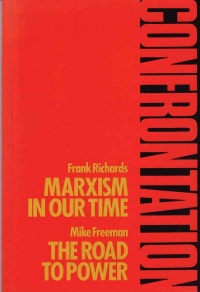
Confrontation was the 'theoretical journal of the Revolutionary Communist Party, first published in the summer of 1986. According to the British Library Confrontation ceased publication after its fifth issue in 1990.[1]
The 'Theoretical journal' of the RCT (titled Revolutionary Communist Papers) seems not to have continued after the RCP was formed in 1981 and it was not until summer 1986 that the RCP began producing the short lived Confrontation, described as the Party 'theoretical journal'. In addition to a range of pamphlets the principal publications of the RCP were The next step, (which it described as a 'review' and later - circa 1990-94) as a 'weekly') and Living Marxism (later renamed LM magazine). The RCP also produced numerous leaflets, posters, newsletters and other materials for its front groups and election literature.
Almost all RCP publications were published by Junius Publications, the party's publishing company set up in late 1977.
Confrontation used the phrase 'Living Marxism' as the title for its editorial more than two years before the appearance of the magazine of that title. Editions appeared once a year in 1986 and Summer 1987. Two issues appeared in Summer 1988, the second featuring only two articles both of which were long at 129 pages in total and laid out the Party line on 'Labourism' and the third Thatcher term. By the next edition of Summer 1989 the party had begun the process that would eventually lead to its rejection of Marxism. The man part of the journal is taken up with seven essays under the title 'The death agony of Stalinism - A symposium' which were said to be 'the proceedings of a recent conference on Stalinism'[2] Party leader Frank Furedi using his cadre name Frank Richards closed his concluding overview essay with an optimistic take on what he called 'capitalist restoration in the Stalinist world':
- The decay of Stalinism now offers the potential to rehabilitate Marxism. After the Gorbachev reforms are implemented it will no longer be possible to blame Marx and Lenin for the failings of the Stalinist bureaucracy. Whatever the short term cost of capitalist restoration in the Stalinist world, the destruction of Stalinism will remove an historic barrier to the self-emancipation of the international working class'.[3]
As it turned out, the cost of capitalist restoration was not short term, but quite long lived. At this stage however, the party appeared still to believe that it had a bright future. Introducing the symposium papers Mike Freeman dismissed the 'British Left's traditional approach of swapping impressions and trading labels' remind readers that whatever the RCP was it was not part of the British left. Instead the papers were said to 'represent the first stages of the RCP's investigation of the demise of world Stalinism' discussion of which 'we hope to continue in the journal'.[4] As it turned out the journal then disappeared with no further issues for seven years, by which time the party had resolved to abolish itself.
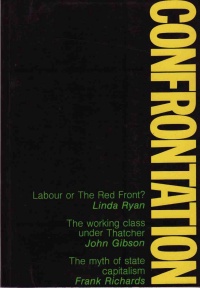
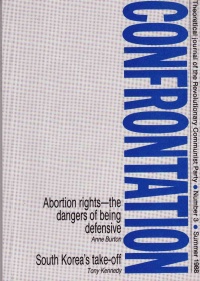
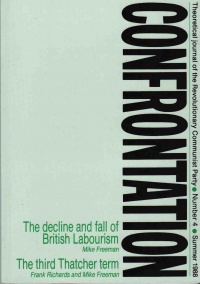
Contents
Issues
1 - 1986
- Sabena Norton, 'Editorial: Living Marxism', Confrontation Number 1 Summer 1986. London: Junius Publications Ltd, June 1986, p. 1-3.
- Frank Richards, 'Marxism in our time', Confrontation Number 1 Summer 1986. London: Junius Publications Ltd, June 1986, p. 4-31.
- Mike Freeman 'The road to power', Confrontation Number 1 Summer 1986. London: Junius Publications Ltd, June 1986, p. 32-89.
- Paul Flewers, 'The rise and decline of British Stalinism', review of Noreen Branson, History of the communist Party of Great Britain, 1927-1941, 1985, Confrontation Number 1 Summer 1986. London: Junius Publications Ltd, June 1986, p. 90-101.
- Keith Tompson, 'A flawed critique' Review of Ellen Meiksens Wood The Retreat from class: a new 'true' socialism, Verso, London, 1985, Confrontation Number 1 Summer 1986. London: Junius Publications Ltd, June 1986, p. 102-105.
2 - 1987
- Mike Freeman, 'Editorial: Taking on Labourism', Confrontation, No. 2, Summer 1987, London: Junius Publications, ISSN 0269-9966, p. 1-5.
- Linda Ryan, 'Labour or The Red Front?, Confrontation, No. 2, Summer 1987, London: Junius Publications, ISSN 0269-9966, p. 7-30.
- John Gibson, 'The working class under Thatcher', Confrontation, No. 2, Summer 1987, London: Junius Publications, ISSN 0269-9966, p. 31-83.
- Frank Richards, 'The myth of state capitalism', Confrontation, No. 2, Summer 1987, London: Junius Publications, ISSN 0269-9966, p. 87-113.
- Kate Marshall, 'Picking up the fragments, Review of Elizabeth Wilson (with Angela Weir), Hidden Agendas: Theory, Politics and Experience in the Women's Movement, Tavistock, 1986, Confrontation, No. 2, Summer 1987, London: Junius Publications, ISSN 0269-9966, p. 115-122.
3 - Summer 1988
- Mike Freeman, 'Editorial' Confrontation, No. 3, Summer 1988, July, London: Junius Publications, ISSN 0269-9966, p. 5-10.
- Anne Burton, 'Abortion rights - the dangers of being defensive' Confrontation, No. 3, Summer 1988, July, London: Junius Publications, ISSN 0269-9966, p. 11-59.
- Tony Kennedy, 'South Korea's takeoff and the theory of imperialism' Confrontation, No. 3, Summer 1988, July, London: Junius Publications, ISSN 0269-9966, p. 61-144.
- Gemma Forest 'Marxism and the mid-century', Review of Ernest Mandel, The Making of the Second world War', Verso, 1986 Confrontation, No. 3, Summer 1988, July, London: Junius Publications, ISSN 0269-9966, p. 147-155.
- Mark Reilly 'The failure of Irish nationalism', Review of Clare O'Halloran Partition and the Limits of Irish Nationalism, Gill and Macmillsn, 1987, Confrontation, No. 3, Summer 1988, July, London: Junius Publications, ISSN 0269-9966, p. 157-163.
4 - Summer 1988
- Mike Freeman, 'Editorial' Confrontation, No. 4, Summer 1988, July, London: Junius Publications, ISSN 0269-9966, p. 5-12.
- Mike Freeman, 'The decline and fall of British Labourism' Confrontation, No. 4, Summer 1988, July, London: Junius Publications, ISSN 0269-9966, p. 13-83.
- Frank Richards and Mike Freeman, 'The third Thatcher term' Confrontation, No. 4, Summer 1988, July, London: Junius Publications, ISSN 0269-9966, p. 85-144.
5 - Summer 1989
- Editorial
- Mike Freeman 'Stalinism.. RIP', p. 5-11.
- The death agony of Stalinism - A symposium - Includes 'the proceedings of a recent conference on Stalinism'[5]
- Mick Hume 'Was Lenin a Stalinist?(or vice versa)?', p. 13-26.
- Rob Knight 'In Gorbachev's back yard', p. 27-37.
- Russell Osborne, 'Poland in transition', 39-48.
- Joan Phillips 'Hungary: the party that tried to bury its past', p. 49-60.
- Kirsten Cale and Mike Freeman 'Eurocommunism in ruins', p. 61-84.
- Alan Harding, 'China: Stalinism and national liberation', p. 85-
- Frank Richards, 'Thesis on Stalinism in the Gorbachev Era', p. 101-110.
- Can Europe be one?
- James Wood 'A Marxist perspective on 1992', p.111-174
- Reviews
- Authors include Jon Hann, Mike Freeman, Joe Hall, Kenan Malik, John Gibson, Eve Anderson
Volume II
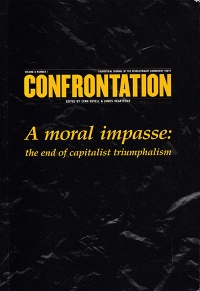
The journal appears to have been resurrected briefly in 1996 when Living Marxism advertised it as Confrontation: A Moral Impasse and described it as the RCP 'theoretical journal'.[6] It was said to be edited by Lynn Revell and James Heartfield. The first, and seemingly only, number of 'volume II' included an article by Heartfield:
Contents
- Contributors & Preface, a scanned pdf can be viewed here. A Moral Impasse: The End of Capitalist Triumphalism, Confrontation, Vol II, No. I, London: Junius, 1996.
Confrontation is a Marxist journal that is committed to challenging the contemporary climate of irrationalism and anti-humanism.
The intellectual exhaustion that has engulfed not just the left but all political traditions presents a challenge to everyone who favours progress and reason. Regressive trends to curb democratic rights, scientific developments and freedom of speech are all symptomatic of the way that our narrowing political culture is growing increasing hostile to the development of human agency and subjectivity.
The closure of political options and debate could be a barrier to new ideas. At Confrontation, however, we believe that this is the best time to reclaim the banner of critical thinking. The collapse of the old political framework presents many challenges, but also many opportunities. For the first time in 70 years revolutionaries are free of the baggage of past programmes and projects to map out a new course for society.
Confrontation will be dedicated to creating the revolutionary theory for a new revolutionary project.[7]
- Contents page, a scanned pdf can be viewed here. A Moral Impasse: The End of Capitalist Triumphalism, Confrontation, Vol II, No. I, London: Junius, 1996.
- Introduction, a scanned pdf can be viewed here. A Moral Impasse: The End of Capitalist Triumphalism, Confrontation, Vol II, No. I, London: Junius, 1996.
In this issue Phil Mullan looks at the way that economic science has become increasingly preoccupied with the subjective responses of individuals; James Heartfield examines the way that academia has lost its faith in reason; Norman Lewis reviews the lost certainties of Cold War politics in international relations; Lynn Revell challenges the penchant for cultural explanation in social life; Jane Cullen looks at the real fears behind the underclass debate; and Andy Clarkson questions the underlying problem with nationalism today.
In their different ways all of these articles are looking at the moral impasse that bedevils the elites throughout the Western world. The intellectual crisis that we find in these different fields is itself a reflection of the loss of purpose that has engulfed the West. In economics it is the loss of the alternatives of Keynesianism and the free market that forces the drift into a subjective speculation over confidence. In academic life the growth of anti-rational currents like postmodernism arises out of the falling away of the 'grand narratives' of liberalism and socialism, exposing the meagre rational resources of a compromised elite. In international relations the loss of the certainty of the Cold War has led to a veritable nostalgia for the days of the Cuban missile crisis, when the ruling classes at least knew where they stood. With the falling away of social explanations, culture is thrust forward as the universal, and empty, explanation of social and international division. In the underclass debate, we find an elite whose loss of moral purpose is projected, viciously and arbitrarily, upon the poor. And finally, even the elite's trump card, popular nationalism, presents a barrier to elite politics today.
These essays are not meant as historical monographs on a bygone age. Rather they are the first step in claiming the abandoned ground of reason for revolutionaries. The events of the past six years have presented us with profound challenges, but they also present us with profound opportunities.[8]
- Phil Mullan, 'Confidence in the Slump', A Moral Impasse: The End of Capitalist Triumphalism, Confrontation, Vol II, No. I, London: Junius, 1996.
- James Heartfield, 'The limits of social construction theory', A Moral Impasse: The End of Capitalist Triumphalism, Confrontation, Vol II, No. I, London: Junius, 1996.[9]
- Norman Lewis, 'America after the Cold War', A Moral Impasse: The End of Capitalist Triumphalism, Confrontation, Vol II, No. I, London: Junius, 1996.
- Lynn Revell, 'The Cultural Apology', A Moral Impasse: The End of Capitalist Triumphalism, Confrontation, Vol II, No. I, London: Junius, 1996.
- Jane Cullen, 'The return of the Residuum', A Moral Impasse: The End of Capitalist Triumphalism, Confrontation, Vol II, No. I, London: Junius, 1996.[10]
- Andy Clarkson, 'The Problem with Nationalism', A Moral Impasse: The End of Capitalist Triumphalism, Confrontation, Vol II, No. I, London: Junius, 1996.
Notes
- ↑ British Library Integrated Catelogue System number 012405040 Cataloguing level Minimal record Title CONFRONTATION -LONDON- JUNIUS PUBLICATIONS LIMITED-., accessed 6 November 2011
- ↑ From an advert in Living Marxism, February 1990, No. 16 p. 10.
- ↑ Frank Richards, 'Thesis on Stalinism in the Gorbachev Era', in The death agony of Stalinism - A symposium', Confrontation, No. 5, Summer 1989, p. 101-110.
- ↑ Mike Freeman 'Editorial: Stalinism.. RIP', Confrontation, No. 5, Summer 1989, p. 5-11.
- ↑ From an advert in Living Marxism, February 1990, No. 16 p. 10.
- ↑ See Living Marxism, No. 96, December 1996/January 1997, p.42.
- ↑ Text taken from the Preface to A Moral Impasse: The End of Capitalist Triumphalism, Confrontation, Vol II, No. I, London: Junius, 1996.
- ↑ Text quoted taken from the Introduction to A Moral Impasse: The End of Capitalist Triumphalism, Confrontation, Vol II, No. I, London: Junius, 1996.
- ↑ James Heartfield James Heartfield's Homepage, accessed 9 April 2011
- ↑ Listed in the bibliography of LM network associate Stuart Waiton, The politics of antisocial behaviour, Berkshire: Open University Press, 2008